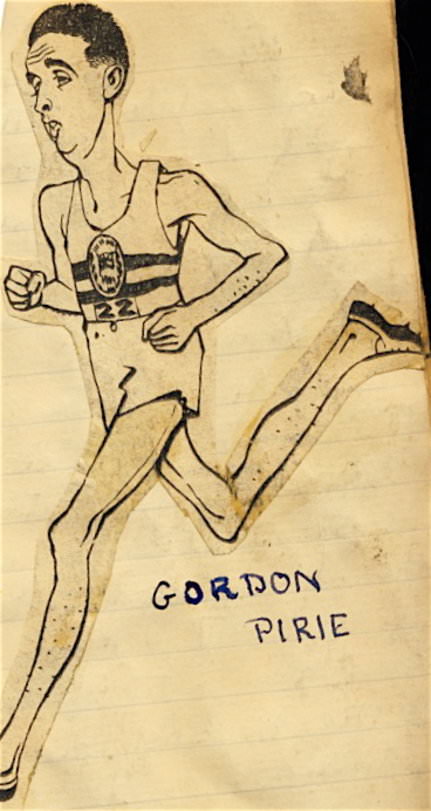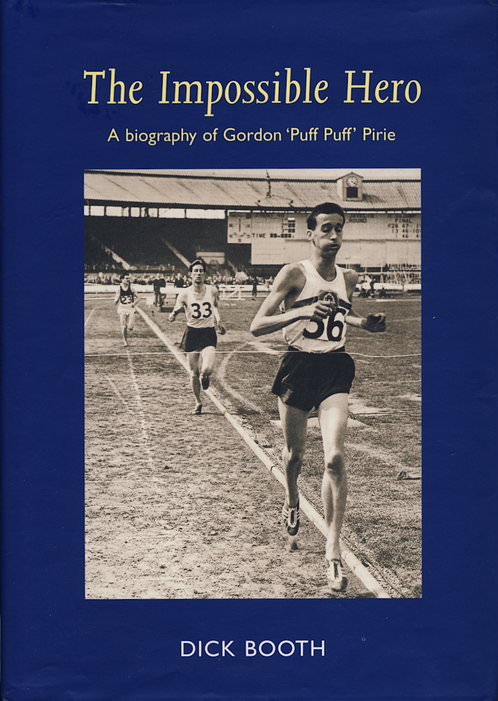Book Review: The Impossible Hero: A Life of Gordon Pirie
By Dick Booth
London: Corsica Press, 1999 286pp
Gordon Pirie and I crossed paths four times—though I’d have to say that his path was a huge airport runway to my narrow footpath. Before I ever saw him, he appeared several times in my 1952-1954 sports scrapbook (See right). I’m not sure when I first saw him run, but it may well have been the 1960 London-Brighton Relay: we were both on the cover of Athletics Weekly with me, alas, on a bicycle following the race. From my vantage point behind him, I was struck with the intensity of his running as he tried unsuccessfully to outrun Bruce Tulloh.
 |
A year later I met him at Boson in Sweden and made the following notes in my running diary: “In the evening Gordon Pirie turned up with his wife and Michel Bernard. Gordon told us that Jack Crump had been worrying him about expenses again.” Gordon raced against Bernard the next night in Stockholm and was fifth in a Mile. My diary continued: “We met Gordon after and he told us how Bernard had elbowed him twice in the last lap. He said all Frenchmen were crooks.”
The next time I met Gordon was after my disastrous initiation into orienteering. After the event, he kindly spent a lot of time showing me where I went wrong. Then about 20 years later he was my house guest in Victoria, Canada. While in Victoria he coached anyone who came near him on the track, including me. He clearly had a strong need to do this coaching.
These four encounters illustrate four character traits of this very complex man: his intensity, his outspokenness, his generosity and his need to help others. Dick Booth’s superb biography deals with these traits and many others in great detail. Pirie was a very contradictory person: you loved him, you hated him, you admired him, you pitied him. His main flaw was that he was often unable to control his intensity. The censor mechanism that most of us have to control our anger and strong feelings was lacking in Gordon Pirie’s make up. Thus he quickly became a rebel in the media. His outspokenness was just what reporters wanted.
Booth was clearly fascinated by Pirie’s character. He has thoroughly researched Pirie’s life: his early family days, his early career as a club runner with South London Harriers, the glory years of his competitive career, his overseas travels in Europe and New Zealand, and his last days as a cancer patient. Booth spends 25 pages on his childhood, 155 pages on his competitive years and a rather stretched-out 85 pages on his later life of coaching. The biography is full of details and witness accounts that help get to the essence of Gordon Pirie. I particularly liked his chapter on Woldemar Gerschler, Pirie’s German coach. Booth also does a good job making Pirie’s best races come alive—for example, the opening chapter that describes Pirie’s great WR defeat of Kuts in Bergen. I’ll never forget 13:36.8!
 |
Booth is also effective in providing some cultural background. He explains the club culture that nourished Pirie early on. He conveys the importance of the popular White City in Pirie’s career. He demonstrates how Pirie changed the general British attitude to athletics. He explains the economics of Pirie’s ambition. He illuminates the importance of the media for Pirie.
No doubt, Pirie was arrogant. He looked down on the world from a great height. Despite his continual need for money, he always drove a Mercedes. I can think of only two people he really respected: Emil Zatopek and Woldemar Gerschler. But in stark contrast, he had a genuine desire to help people. Booth’s long account of his coaching days underlines this trait many times. But then he was a very impatient man. This impatience, combined with his inability to sublimate his strong feelings meant that he fell out with a lot of people in his life.
Pirie lived his life intensely. This was especially true with his training, which he later admitted was excessive. What a contrast he is with his hero Zatopek, who was a gentle, amicable soul, beloved by many. Maybe Pirie’s intensity, which surely contributed to his success, was also the flaw that prevented him from winning many big races—though I am full of admiration for his running in the Melbourne Olympics.
Booth’s The Impossible Hero is one of the great runner biographies. It is not easy to find. My copy was a reject from the Wirral Library and looked unread when I received it. Dick Booth is knowledgeable about running and he has done admirable research. As well, the generous number of illustration give this book even more value. Pirie deserves to have such a fine biographer. 
Leave a Comment